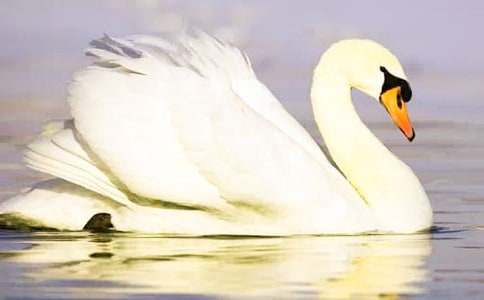安徒生童话故事第61篇:天鹅的窠The Swan’s Nest
引导语:天鹅在大家心目是否是很美丽的?那么大家知道它的窠是身体的哪个部位?下面就是相关的安徒生童话故事,欢迎大家阅读!

在波罗的海和北海之间有一个古老的天鹅窠。它名叫丹麦。天鹅就是在它里面生出来的,过去和现在都是这样。它们的名字永远不会被人遗忘。
在远古的时候,有一群天鹅飞过阿尔卑斯山,在"五月的国度"①里的绿色平原上落下来。住在这儿是非常幸福的。
这一群天鹅叫做"长胡子人"②。
另外一群长着发亮的羽毛和诚实的眼睛的天鹅,飞向南方,在拜占庭③落下来。它们在皇帝的座位周围住下来,同时伸开它们的白色大翅膀,保护他的盾牌。这群天鹅叫做瓦林格人④。
法国的海岸上升起一片惊恐的声音,因为嗜血狂的天鹅,拍着带有火焰的翅膀,正在从北方飞来。人们祈祷着说:"愿上帝把我们从这些野蛮的北欧人手中救出来!”
一只丹麦的天鹅⑤站在英国碧绿的草原上,站在广阔的海岸旁边。他的头上戴着代表三个王国的皇冠;他把他的王节伸向这个国家的土地上。
波美尔⑥海岸上的异教徒都在地上跪下来,因为丹麦的天鹅,带着绘有十字的旗帜和拔出的剑,向这儿飞来了。
那是很久很久以前的事情!你会这样说。
不过离我们的时代不远,还有两只强大的天鹅从窠里飞出来了。
一道光射过天空,射到世界的每个国土上。这只天鹅拍着他的强大的翅膀,撒下一层黄昏的烟雾。接着星空渐渐变得更清楚,好像是快要接近地面似的。这只天鹅的名字是透却·布拉赫⑦。
“是的,那是多少年以前的'事情!"你可能说,"但是在我们的这个时代呢?”
在我们的这个时代里,我们曾看见过许多天鹅在美丽地飞翔:有一只⑧把他的翅膀轻轻地在金竖琴的弦上拂过去。这琴声响遍了整个的北国:挪威的山似乎在古代的太阳光中增高了不少;松林和赤杨发出沙沙的回音;北国的神仙、英雄和贵妇人在深黑的林中偷偷地露出头角。
我们看到一只天鹅在一个大理石山上拍着翅膀⑨,把这座山弄得崩裂了。被囚禁在这山中的美的形体,现在走到明朗的太阳光中来。世界各国的人抬起他们的头来,观看这些绝美的形体。
我们看到第三只天鹅⑩纺着思想的线。这线绕着地球从这个国家牵到那个国家,好使语言像闪电似的从这个国家传到那个国家。
我们的上帝喜欢这个位于波罗的海和北海之间的天鹅窠。让那些强暴的鸟儿从空中飞来颠覆它吧。"永远不准有这类事情发生!"甚至羽毛还没有长全的小天鹅都会在这窠的边缘守卫——我们已经看到过这样的事情。他们可以让他们的柔嫩的胸脯被啄得流血,但他们会用他们的嘴和爪斗争下去。
许多世纪将会过去,但是天鹅将会不断地从这个窠里飞出来。世界上的人将会看见他们,听见他们。要等人们真正说"这是最后的一只天鹅,这是天鹅窠里发出的一个最后的歌声",那时间还早得很呢!
①指意大利伦巴底亚(Lombardia)省的首府米兰(Milano)。
②原文是Longobardre,指住在意大利伦巴底亚省的伦巴底人(Lombardo)。
③这是东罗马帝国的首都。
④原文是Vaeringer,这是一种北欧人;他们在9世纪时是波罗的海上有名的海盗。东罗马帝国的近卫队,就是由这些海盗组成的。
⑤指丹麦的克努得大帝(Kund,942-1036)。他征服了英国和挪威,做过这三个国家的皇帝。
⑥这是波罗的海的一个海湾。
⑦透却·布拉赫(Tycho Brahè,1546-1601)是丹麦的名天文学家。
⑧指Asam Gottlob Oehlensehlager,1779-1850,丹麦的名诗人。
⑨指Bertel Thorvaldsen,1768-1844,丹麦的名雕刻家。
⑩指奥尔斯德特(Hans Christian Oersted,1777-1851)丹麦的名电子学家。
天鹅的窠英文版:
The Swan’s Nest
BETWEEN the Baltic and the North Sea there lies an old swan’s nest, wherein swans are born and have been born that shall never die.
In olden times a flock of swans flew over the Alps to the green plains around Milan, where it was delightful to dwell. This flight of swans men called the Lombards.
Another flock, with shining plumage and honest eyes, soared southward to Byzantium; the swans established themselves there close by the Emperor’s throne, and spread their wings over him as shields to protect him. They received the name of Varangians.
On the coast of France there sounded a cry of fear, for the blood-stained swans that came from the North with fire under their wings; and the people prayed, “Heaven deliver us from the wild Northmen.”
On the fresh sward of England stood the Danish swan by the open seashore, with the crown of three kingdoms on his head; and he stretched out his golden sceptre over the land. The heathens on the Pomerian coast bent the knee, and the Danish swans came with the banner of the Cross and with the drawn sword.
“That was in the very old times,” you say.
In later days two mighty swans have been seen to fly from the nest. A light shone far through the air, far over the lands of the earth; the swan, with the strong beating of his wings, scattered the twilight mists, and the starry sky was seen, and it was as if it came nearer to the earth. That was the swan Tycho Brahe.
“Yes, then,” you say; “but in our own days?”
We have seen swan after swan soar by in glorious flight. One let his pinions glide over the strings of the golden harp, and it resounded through the North. Norway’s mountains seemed to rise higher in the sunlight of former days; there was a rustling among the pine trees and the birches; the gods of the North, the heroes, and the noble women, showed themselves in the dark forest depths.
We have seen a swan beat with his wings upon the marble crag, so that it burst, and the forms of beauty imprisoned in the stone stepped out to the sunny day, and men in the lands round about lifted up their heads to behold these mighty forms.
We have seen a third swan spinning the thread of thought that is fastened from country to country round the world, so that the word may fly with lightning speed from land to land.
And our Lord loves the old swan’s nest between the Baltic and the North Sea. And when the mighty birds come soaring through the air to destroy it, even the callow young stand round in a circle on the margin of the nest, and though their breasts may be struck so that their blood flows, they bear it, and strike with their wings and their claws.
Centuries will pass by, swans will fly forth from the nest, men will see them and hear them in the world, before it shall be said in spirit and in truth, “This is the last swan—the last song from the swan’s nest.”
【安徒生童话故事第61篇:天鹅的窠The Swan’s Nest】相关文章:
天鹅的童话故事:六只天鹅12-10
安徒生童话故事:狠毒的王子12-10
安徒生童话故事(15篇)12-15
安徒生童话故事:打火匣12-10
安徒生童话故事15篇11-15
安徒生童话故事集锦15篇12-25
安徒生童话故事合集15篇12-22
安徒生童话故事:《无所畏惧的王子》12-10
安徒生童话故事:小意达的花儿12-10
安徒生童话故事《海的女儿》好词好句09-26